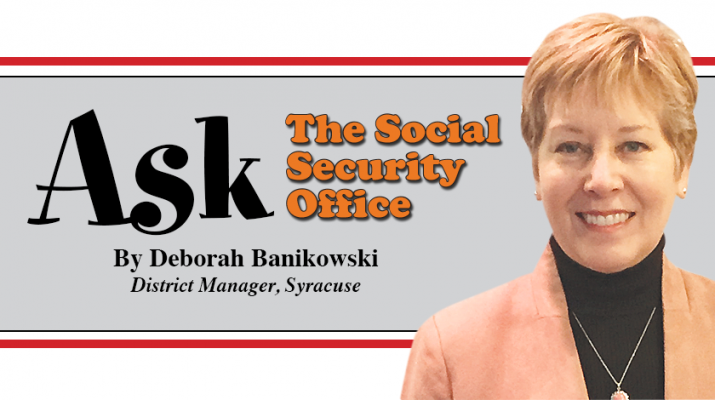By Deborah Banikowski
District Manager, Syracuse
In the digital age, frauds and scams are an unfortunate part of doing business online. During the holiday season, Social Security has traditionally seen a spike in phishing scams, and we want to protect you as best we can.
We urge you to always be cautious and to avoid providing sensitive information such as your Social Security number (SSN) or bank account information to unknown individuals over the phone or internet. If you receive a call and aren’t expecting one, you must be extra careful. You can always get the caller’s information, hang up, and — if you do need more clarification — contact the official phone number of the business or agency that the caller claims to represent. Never reveal personal data to a stranger who called you.
Please take note: there’s a scam going around right now. You might receive a call from someone claiming to be from Social Security or another agency. Calls can even display the 1-800-772-1213, Social Security’s national customer service number, as the incoming number on your caller ID. In some cases, the caller states that Social Security does not have all of your personal information, such as your Social Security number, on file. Other callers claim Social Security needs additional information so the agency can increase your benefit payment or that Social Security will terminate your benefits if they do not confirm your information. This appears to be a widespread issue, as reports have come from people across the country. These calls are not from Social Security.
Callers sometimes state that your Social Security number is at risk of being deactivated or deleted. The caller then asks you to provide a phone number to resolve the issue. People should be aware the scheme’s details may vary; however, you should avoid engaging with the caller or calling the number provided, as the caller might attempt to acquire personal information.
Social Security employees occasionally contact people by telephone for customer-service purposes. In only a few special situations, such as when you have business pending with us, a Social Security employee may request the person confirm personal information over the phone.
Social Security employees will never threaten you or promise a Social Security benefit approval or increase in exchange for information. In those cases, the call is fraudulent, and you should just hang up. If you receive these calls, please report the information to the Office of the Inspector General at 1-800-269-0271 or online at oig.ssa.gov/report.
Remember, only call official phone numbers and use secured websites of the agencies and businesses you know are correct. Protecting your information is an important part of Social Security’s mission to secure today and tomorrow.
Q&A
Q: I’m trying to figure out the best time to retire based on my future earnings. How can I calculate my own retirement benefit estimate?
A: We suggest you use our retirement estimator at www.socialsecurity.gov/estimator. Our retirement estimator produces estimates based on your actual Social Security earnings record, so it’s a personalized, instant picture of your future estimated benefit. Also, you can use it to test different retirement scenarios based on what age you decide to start benefits. For example, you can find out your estimated monthly payments if you retire at age 62, 70, or any age in between. Try it out now at www.socialsecurity.gov/estimator.
Q: How do I know if I meet the eligibility requirements to get Social Security disability benefits?
A: To qualify for Social Security disability benefits, you must have worked long enough in jobs covered by Social Security (usually 10 years). You must also have a medical condition that meets Social Security’s strict definition of disability. We consider an adult disabled under our rules if he or she has a medical condition, or combination of medical conditions, that are expected to last for at least one year or result in death, and that prevent the performance of any type of work.
If you think you may be eligible to receive disability benefits and would like to apply, you can use our online application at www.socialsecurity.gov/applyfordisability.
Q: Why is there a five-month waiting period for Social Security disability benefits?
A: The law states Social Security disability benefits can be paid only after you have been disabled continuously throughout a period of five full calendar months. Social Security disability benefits begin with the sixth full month after the date your disability began. You are not able to receive benefits for any month during the waiting period. Learn more at our website: www.socialsecurity.gov/disability.

